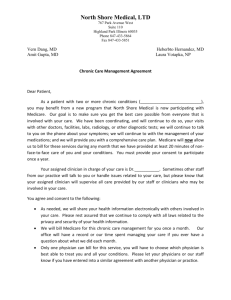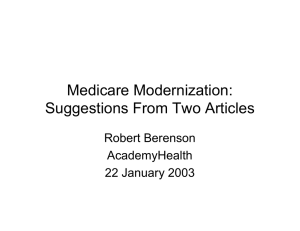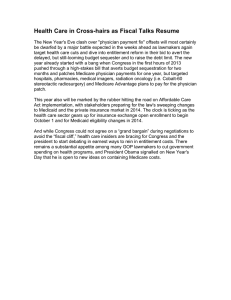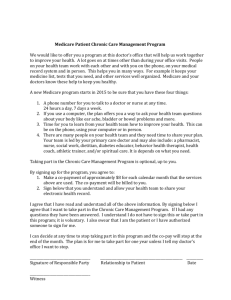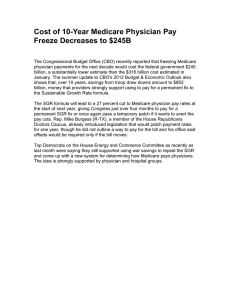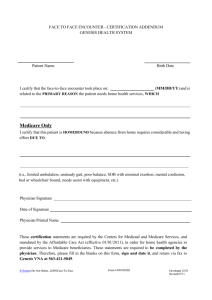The Medicare Chronic Care Improvement Program Robert A. Berenson
advertisement
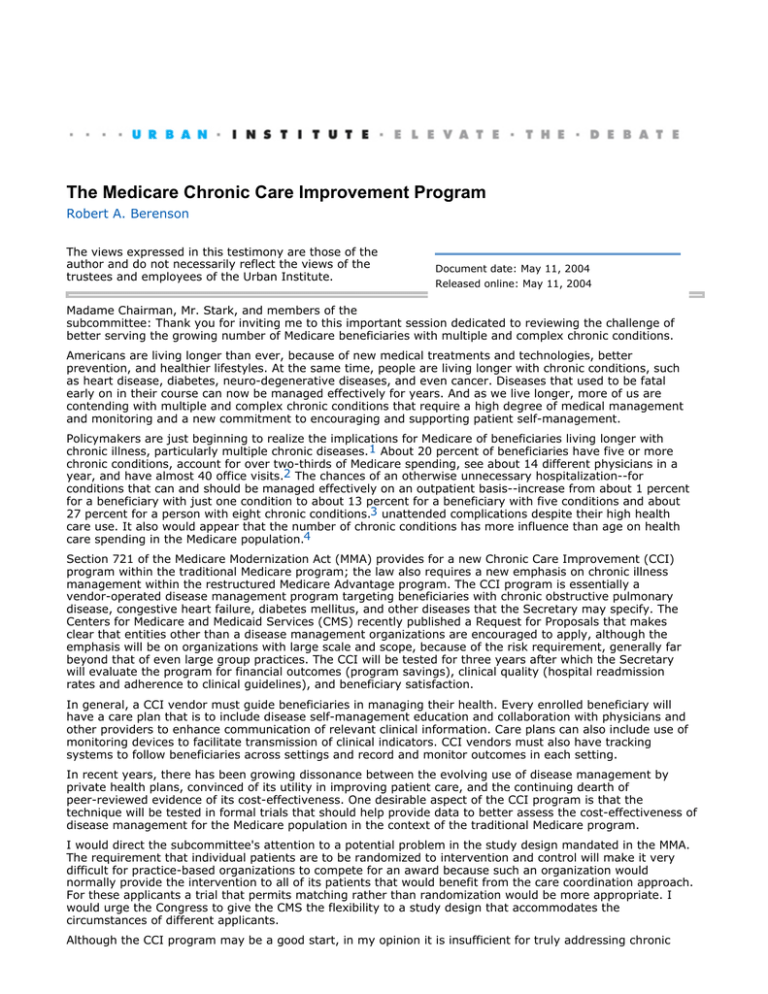
The Medicare Chronic Care Improvement Program Robert A. Berenson The views expressed in this testimony are those of the author and do not necessarily reflect the views of the trustees and employees of the Urban Institute. Document date: May 11, 2004 Released online: May 11, 2004 Madame Chairman, Mr. Stark, and members of the subcommittee: Thank you for inviting me to this important session dedicated to reviewing the challenge of better serving the growing number of Medicare beneficiaries with multiple and complex chronic conditions. Americans are living longer than ever, because of new medical treatments and technologies, better prevention, and healthier lifestyles. At the same time, people are living longer with chronic conditions, such as heart disease, diabetes, neuro-degenerative diseases, and even cancer. Diseases that used to be fatal early on in their course can now be managed effectively for years. And as we live longer, more of us are contending with multiple and complex chronic conditions that require a high degree of medical management and monitoring and a new commitment to encouraging and supporting patient self-management. Policymakers are just beginning to realize the implications for Medicare of beneficiaries living longer with chronic illness, particularly multiple chronic diseases. 1 About 20 percent of beneficiaries have five or more chronic conditions, account for over two-thirds of Medicare spending, see about 14 different physicians in a year, and have almost 40 office visits.2 The chances of an otherwise unnecessary hospitalization--for conditions that can and should be managed effectively on an outpatient basis--increase from about 1 percent for a beneficiary with just one condition to about 13 percent for a beneficiary with five conditions and about 27 percent for a person with eight chronic conditions.3 unattended complications despite their high health care use. It also would appear that the number of chronic conditions has more influence than age on health care spending in the Medicare population.4 Section 721 of the Medicare Modernization Act (MMA) provides for a new Chronic Care Improvement (CCI) program within the traditional Medicare program; the law also requires a new emphasis on chronic illness management within the restructured Medicare Advantage program. The CCI program is essentially a vendor-operated disease management program targeting beneficiaries with chronic obstructive pulmonary disease, congestive heart failure, diabetes mellitus, and other diseases that the Secretary may specify. The Centers for Medicare and Medicaid Services (CMS) recently published a Request for Proposals that makes clear that entities other than a disease management organizations are encouraged to apply, although the emphasis will be on organizations with large scale and scope, because of the risk requirement, generally far beyond that of even large group practices. The CCI will be tested for three years after which the Secretary will evaluate the program for financial outcomes (program savings), clinical quality (hospital readmission rates and adherence to clinical guidelines), and beneficiary satisfaction. In general, a CCI vendor must guide beneficiaries in managing their health. Every enrolled beneficiary will have a care plan that is to include disease self-management education and collaboration with physicians and other providers to enhance communication of relevant clinical information. Care plans can also include use of monitoring devices to facilitate transmission of clinical indicators. CCI vendors must also have tracking systems to follow beneficiaries across settings and record and monitor outcomes in each setting. In recent years, there has been growing dissonance between the evolving use of disease management by private health plans, convinced of its utility in improving patient care, and the continuing dearth of peer-reviewed evidence of its cost-effectiveness. One desirable aspect of the CCI program is that the technique will be tested in formal trials that should help provide data to better assess the cost-effectiveness of disease management for the Medicare population in the context of the traditional Medicare program. I would direct the subcommittee's attention to a potential problem in the study design mandated in the MMA. The requirement that individual patients are to be randomized to intervention and control will make it very difficult for practice-based organizations to compete for an award because such an organization would normally provide the intervention to all of its patients that would benefit from the care coordination approach. For these applicants a trial that permits matching rather than randomization would be more appropriate. I would urge the Congress to give the CMS the flexibility to a study design that accommodates the circumstances of different applicants. Although the CCI program may be a good start, in my opinion it is insufficient for truly addressing chronic care needs in Medicare because it lacks a focused physician component. The Administration emphasizes that the new program creates a "business platform" that will permit innovation, but the CCI program ignore the reality that beneficiaries look to their personal physicians for responsibility for their health care -- and not business platforms -- whether health plans, disease management companies, or other third party-vendors. Policymakers need to tackle the difficult challenge of engaging those responsible for health care quality and use, namely the doctors and other health care professionals. Further, in order to be successful, disease management and related case management should work better with the active involvement of the patient's physician. 5 Again and again studies have shown that care coordination only works with real physician involvement. Unfortunately, the CCI initiative is quite removed from the physician, although the legislation correctly calls for an individual's care plan to include physician education and collaboration. Consistent with the overall philosophy of the MMA, this approach to addressing the growing need for improved care for those with chronic health conditions is a corporate one, focused on providing contracts to third-party vendors, rather than directly enabling professionals to better serve their patients. The traditional Medicare program has an unrealized opportunity to lead the restructuring of how physicians organize and deliver health services, as called for by the Institute of Medicine in its seminal "Crossing the Quality Chasm" report.6 Instead, the MMA would have Medicare merely follow private sector approaches have been tested in younger and somewhat healthier populations and that may not be as well suited to the Medicare beneficiaries. Disease management can likely bring important benefits, such as improved functioning and decreased hospitalizations, to relatively healthy individuals, with a well-defined chronic condition. It is also proper that CCI programs are required to identify and address enrollee co-morbidities. However, these programs have not generally been designed to address successfully the needs of medically complex patients, whose needs go well beyond learning disease self- management techniques and who have multiple professionals affecting the care and treatments of their different conditions. Nor are they designed to meet the needs of individuals with dementia, and, therefore cannot benefit form disease management's heavy emphasis on patient self-education. It will be challenging for disease management companies and other vendors who may be awarded contracts under the initiative to develop the necessary links with physicians, especially because the law provides no new reason for physicians to engage with them. Creating effective relationships with treating physicians is further complicated by the probability that these management companies will be operating across great distances from a central location with no particular connection to the communities in which they will operate. Medicare disease management would benefit a certain segment of beneficiaries, and this approach could certainly be part of a comprehensive strategy to improve the care provided to Medicare beneficiaries with multiple chronic conditions. But it is not a sufficient response. These private-sector approaches have arisen partly because many physicians have been impervious to the altered needs of a patient population with far more well-established, chronic conditions and far fewer acute medical events than their training has prepared them for. In addition, the financial underpinnings of a typical medical practice do not support physicians who actually do recognize the need to be more fully engaged in the components of chronic care coordination. These include: teaching patient self-management; communicating more often with patients outside of face-to-face office visits; managing polypharmacy; coordinating care among many other professionals and providers to avoid redundancy and errors; developing and maintaining more appropriate medical information summaries, preferably inside an electronic health record; and more forthrightly helping prepare patients and their families for death and dying. Simply stated, the Medicare payment system does not pay for these activities, so physicians either do not deliver these services directly or go unpaid when trying to do so. Bounced around the system, too many Medicare beneficiaries do not even recognize a particular physician who is responsible for coordinating their care. Where no physician is in charge, disease management certainly serves a useful stopgap role. Nevertheless, the program goal should be to promote a patient relationship with a primary care physician or a specialist willing to take overall responsibility for care coordination and the other functions that I identified earlier. Although disease management can assist a patient's primary physician in caring for patients with multiple chronic conditions, its role should be viewed clearly as supplementary to the personal physician's responsibility. Disease management currently appears to serve a useful purpose because of a quality chasm in how health care is delivered. The policy objective should be to address the causes of the chasm and not merely provide a partial stopgap. As stated earlier, among other areas that need attention is the overlooked issue of physician payment policy. Simply put, the incentives inherent in most fee-for-service payment systems, including Medicare's and those of most private payers, penalize primary care physicians who would alter their professional interactions with patients to respond to the challenge posed by the reality of patients with multiple complex chronic conditions. Yet, the MMA mostly ignores alternative payment approaches affecting physician behavior. These payment approaches should go hand in hand with the new chronic care program to ensure the kind of change needed to improve care for Medicare beneficiaries. I would note that Sec 646 of the MMA, the Medicare Health Care Quality Demonstration Program, provides a possible platform for examining new payment approaches. This demonstration should be given high priority and should explicitly address chronic care improvement incentives for physicians and medical groups. Imagine if in the early 1980s, Congress, confronted with soaring Medicare Part A hospital costs produced partly as a result of an inherently inflationary, cost-plus payment system, had decided not to implement the Prospective Payment System. Imagine, instead, that Congress had chosen to fund third-party vendor, utilization review organizations to try to reduce lengths of stay for Medicare patients. That approach might have had some marginal beneficial effects on cost reduction -- and plenty of unpleasant confrontations with physicians and hospital staff. Overall, trying to improve hospital efficiency while ignoring the incentives inherent in the basic payment system would have been foolhardy. Congress showed good sense by going to the root of the problem. I would argue that we now face a similar challenge to get the physician payment systems right, and to do so would mean entering mostly unchartered territory. But is it logical to think you can improve the medical care provided to Medicare beneficiaries with chronic conditions while ignoring physicians? One of the problems, of course, is that the medical profession itself has been slow to recognize that the nature of the practice of medicine is changing and it has not been very assertive in proposing new billing codes and payment approaches that would support altered physician activities. Indeed, as I noted above, I am not sure that most physicians even recognize the care gaps that result from maintaining a traditional orientation to responding expertly to acute medical events, while ignoring the less dramatic, but significant, needs of those with progressive chronic conditions. Recently, the specialty associations representing the primary care physicians who serve Medicare beneficiaries, including the American Academy of Family Physicians, the American College of Physicians, and the American Geriatric Society, have begun to address this particular quality gap and have supported specific legislation that I believe goes in the right direction. I urge the Committee to work with these and other interested parties to explore new payment approaches that should be intrinsic to any serious effort to refocus Medicare on the unique burden of chronic disease. Physicians should be paid and supported for taking responsibility for assertively coordinating care for patients with complex chronic conditions. Part of that coordination certainly might involve interacting with nurses and others from disease management vendors. We should be testing various new payment approaches. There are already limited precedents in the Medicare physician payment system for the kinds of changes that would be needed. In contrast to true prospective payment systems used for other provider types, the physician payment system suffers for being "fee for individual items of service." Yet, renal physicians for many years have received a monthly capitation payment for their professional services for end-stage renal disease. Similarly, Medicare pays for a few "care plan oversight services," e.g., for patients under the care of home health agencies. These small payment precedents should be examined and built on. Payment models could distinguish how well a medical practice is integrated. For example, solo and other small practices might receive relatively small care management fees that essentially would enable them to better communicate with disease management vendors. On the other hand, larger, more integrated practices would receive larger care management fees and possibly Part B or maybe even Part A payments under some circumstances. This would that permit them to directly manage disease, without the need for a separate third-party organization. The additional payments initially might be focused on care coordination for those patients with multiple and complex chronic conditions, but over time I envision that traditional Medicare might pay some multi-specialty group practices forms of capitation for a much broader range of their patients. One new payment model has appeared in slightly different forms in Medicare legislation in the past two sessions of Congress, but ultimately lost out to the corporate approach. 7 A token Medicare Care Management Demonstration, Section 649, similar to this approach, survived in the final MMA. It would place on physicians and their staffs responsibility and accountability for clinical care coordination of medically complex individuals. Participating physicians would coordinate clinical care, consult with other providers as necessary, and receive a monthly administrative payment for the extra time and attention involved. The model could be expanded in a number of ways. For instance, physicians could be required to have on staff or under contract a case management function to make referrals to community resources that could address the supportive service needs of these patients. In addition, CMS has proposed another approach to changing the nature of physician practice -- the physician group practice demonstration, which I understand is scheduled to begin next year if the Office of Management and Budget signs off. However, the demonstration is limited to large-group practices that have at least 200 full-time physicians. The physician group would receive bonus payments to the extent that spending is below established targets. This demonstration is on the right track, although it does not target the population with multiple chronic conditions. The size of the physician group would limit how well the model can be replicated if it proves successful. Nevertheless, it is another approach that attempts to change physician payment incentives and reward greater integration of physician practice and, accordingly, it deserves to be as high a priority as the CCI program. CMS has numerous other demonstrations to test care management and disease management models. However, all of them have design issues that will likely limit their success for medically complex individuals. Several projects target specific diseases, rather than beneficiaries with multiple conditions. And the demonstration models typically ignore addressing the crucial role of the treating physician in care management. In conclusion, I applaud the efforts of Congress in general and this subcommittee in particular for recognizing the unique challenge posed by the growing number of Medicare beneficiaries living with multiple and complex chronic conditions. The disease management initiatives are a useful response, but, in my opinion, an insufficient one. The traditional Medicare program has the opportunity to pioneer in the area of payment policy, as it has successfully done a number of times in other areas. Working with the willing in the medical community, Medicare can help produce overdue restructuring of the practice of medicine and reorient at least some of the delivery system to chronic care management. While the MMA provisions are a start, I believe they are overly focused on a corporate, vendor solution - a business platform -- for problems in the program that would be served better by involving those who actually deliver health care at the front line - physicians and other clinical professionals in their own medical practices. Footnotes 1 Among a number of recent policy documents that examine the issue of chronic conditions and Medicare is Eichner, June and Blumenthal, David, eds. Medicare in the 21st Century: Building a Better Chronic Care System. National Academy of Social Insurance. Washington DC. January 2003. 2 Partnership for Solutions, Medicare: Cost and Prevalence of Chronic Conditions. Johns Hopkins University, Baltimore MD. July 2002. 3 Wolff J. et al. Archives of Internal Medicine, November 11, 2002. 4 Berenson R, Horvath J, Clinical Characteristics of Medicare Beneficiaries and Implications for Medicare Reforms. Prepared for the Center for Medicare Advocacy, March 2002. Accessed February 2004, www.partnershipforsolutions.org/DMS/files/MedBeneficiaries2-03.pdf. It is also true that the presence of chronic conditions is associated with age; however, costs and use are similar for beneficiaries with multiple chronic conditions regardless of age. 5 Chen, A , Brown, R; et al. Best Practices in Coordinated Care. Prepared for the Health Care Financing Administration. Mathematica Policy Research, Princeton NJ. March 2000. Accessed February 2004 at www.mathematica-mpr.com/pdfs/bestsum.pdf. 6 Institute of Medicine. Crossing the Quality Chasm: A New Health System for the 21st Century. National Academy of Sciences. Washington, D.C. March 2001. 7 Most recently, the complex clinical care payment concept was included as a demonstration in the Senate version of the Medicare reform legislation, Section 443 of S. 1, in June 2003. The provision set new standards for physicians willing to participate, including conducting a range of care coordination activities that linked medical and supportive services oriented to the beneficiary and family caregivers. Other Publications by the Authors Robert A. Berenson Usage and reprints: Most publications may be downloaded free of charge from the web site and may be used and copies made for research, academic, policy or other non-commercial purposes. Proper attribution is required. Posting UI research papers on other websites is permitted subject to prior approval from the Urban Institute—contact publicaffairs@urban.org. If you are unable to access or print the PDF document please contact us or call the Publications Office at (202) 261-5687. Disclaimer: The nonpartisan Urban Institute publishes studies, reports, and books on timely topics worthy of public consideration. The views expressed are those of the authors and should not be attributed to the Urban Institute, its trustees, or its funders. Copyright of the written materials contained within the Urban Institute website is owned or controlled by the Urban Institute. Source: The Urban Institute, © 2012 | http://www.urban.org
